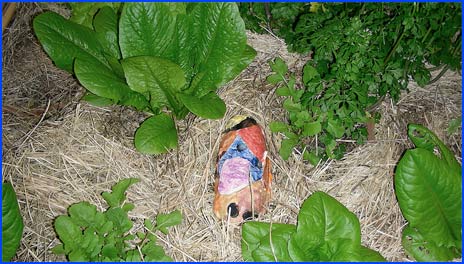
Last time, Childhood Obesity News looked at some of the difficulties faced by Chicago schools in trying to practice garden-based education and to bring the results to school lunch tables. In contrast, Denver public schools follow a different set of guidelines. A group called Slow Food Denver, in the person of chef Andrew Nowak, got together with Leo Lesh, the school system’s food service director.
The reporter asked how they approached interested schools:
‘We asked them to grow mainly cherry tomatoes, cucumbers, peppers and squash for the salad bar,’ [Lesh] said. In this first pilot year, 11 schools supplied up to 20 percent of their produce needs at the peak of the harvest, Nowak estimates. They also harvested and froze hundreds of pounds of pumpkin destined for cranberry-pumpkin breads. ‘I can’t tell you how proud the kids were to pick vegetables at the beginning of the week and then see them on the salad bar a couple of days later,’ said Nowak…
Reporter Monica Eng also explored the situation in Elgin, IL, where a proposal was under development to use five acres of city-owned space for garden-based education. The goal would be to not only grow food, but serve it within the school system. Eng wrote:
Though still in the planning and grant-writing stages, the program’s ‘ultimate goal is to let students experience the whole food cycle,’ said Claudie Phillips, food service director for district U-46. ‘When kids are involved in the growing process and buy into the concept and see the end product, that’s when the whole thing works.’
Michelle Obama’s Let’sMove! program is the reason why these stories get any attention at all. But apparently, even being married to the president is not enough of a credential to create real change across the board. Reportedly, Mrs. Obama’s father once worked on a flatbed truck that rolled around selling vegetables. What does it take to do something like that today? Where mobile produce-vending is permitted, it is surrounded by so many regulations, requiring all kinds of investment, that an aspiring vegetable vendor might well decide to try for law school instead.
The many benefits of gardening at home, in schools, and in community plots have been well-documented. There are direct and indirect effects on the larger problem of the childhood obesity epidemic. But all is not well in America’s gardens. Sarah Anne Hughes reported for The Washington Post:
Adam Guerrero keeps a garden in his Memphis yard, where the math teacher’s students come over to help tend the eggplant, tomato and pepper plants. Around back, there are worm bins, rainwater barrels and beehives. The students make biodiesel and soap in the garage. This tiny ecosystem has been ordered destroyed.
The gardener was accused of creating a public nuisance by letting rubbish, garbage, debris, and personal property accumulate, to the detriment of the home’s appearance. That’s a very rude way to describe such useful items as a worm bin. Those worms will eat not just kitchen scraps, but anything organic. They can turn cardboard into wonderful soil-enriching, organic fertilizer.
A supporter created a blog, Save Adam’s Garden, to tell the story and ask for donations to cover the Guerrero’s legal fees. Other fans started an online petition and a Facebook page. Sarah Kathleen Peck describes the outcome:
Guerrero gets to keep his garden — with some modifications. He has been instructed to keep his front garden trimmed, install mesh covers and fish to reduce the number of mosquitoes, and reduce the number of worm bins on site. In addition, the court recommends that Guerrero move much of his garden activity to an off-site vacant property, in order to encourage and even expand public community garden in Memphis.
The picture on this page — is it debris or décor, or merely a useful tool? Photographer Doug Beckers says:
I put this ceramic slug that was made by my daughter in primary school, into the vegetable garden as an ornament (I couldn’t bear to throw it away) and as it turns out, has proven to be a very effective slug attractant. Slugs crawl underneath it to hide, and can then be easily captured and disposed of before they wreck havoc on my lettuce.
About five months ago, Tulsa, OK, made the news by persecuting yet another gardener. An uncredited author wrote:
Denise Morrison […] started her garden, after becoming unemployed, as a way to feed herself and treat a variety of medical issues. Instead of relying on government handouts, this woman took matters into her own hands and decided to become self sufficient. She filled her yard with things like, fruit trees, berries, nut trees, and a wide variety of edible and medicinal herbs.
Having tangled with the authorities in the past, Morrison followed all local ordinances to the letter, but to no avail. A code enforcement team showed up one day and removed the entire garden, including trees. Imagine trying to explain this to Thomas Jefferson.
Overall, the government seems to contradict itself, encouraging gardening with one hand while smacking down gardeners with the other. Of course, federal authority can’t extend beyond certain boundaries, and localities have the right to make their rules. But mightn’t they be prevented from making rules that step on such a basic human right as feeding oneself?
Your responses and feedback are welcome!
Source: “Most school garden produce is forbidden fruit in CPS lunchrooms,” Chicago Tribune, 10/19/10
Source: “Adam Guerrero’s Memphis garden deemed ‘a nuisance’ (UPDATE),” The Washington Post, 09/21/11
Source: “teacher ordered to remove gardens, deemed a nuisance,” Landscape Urbanism, 09/25/11
Source: “Woman’s Survival Garden Seized and Destroyed by Authorities,” Off Grid Survival, 06/18/12
Image by Doug Beckers.

 FAQs and Media Requests:
FAQs and Media Requests: 











